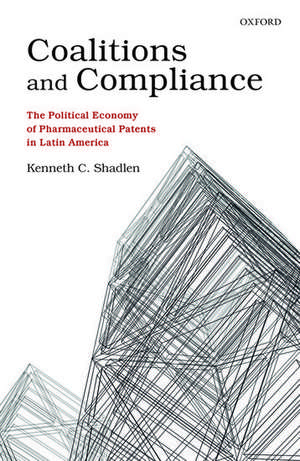Coalitions and Compliance: The Political Economy of Pharmaceutical Patents in Latin America
Autor Kenneth C. Shadlenen Limba Engleză Hardback – 17 aug 2017
Preț: 615.08 lei
Preț vechi: 880.99 lei
-30% Nou
Puncte Express: 923
Preț estimativ în valută:
117.69€ • 123.54$ • 97.69£
117.69€ • 123.54$ • 97.69£
Carte disponibilă
Livrare economică 10-15 martie
Preluare comenzi: 021 569.72.76
Specificații
ISBN-13: 9780199593903
ISBN-10: 0199593906
Pagini: 312
Dimensiuni: 162 x 242 x 25 mm
Greutate: 0.64 kg
Editura: OUP OXFORD
Colecția OUP Oxford
Locul publicării:Oxford, United Kingdom
ISBN-10: 0199593906
Pagini: 312
Dimensiuni: 162 x 242 x 25 mm
Greutate: 0.64 kg
Editura: OUP OXFORD
Colecția OUP Oxford
Locul publicării:Oxford, United Kingdom
Recenzii
Shadlen masterfully uses comparative-historical analysis to explain countries' different reactions to external pressures regarding intellectual property rights. Drawing on substantial original research, he systematically compares a market-preserving patent regime in Argentina, a neo-developmental patent regime in Brazil, and an internationalist patent regime in Mexico. The argument is a triumphant theoretical and substantive success, formulating and applying a convincing analytical framework for understanding diversity in national responses to the new global order in intellectual property rights.
Ken Shadlen's fascinating new book unveils the complexities of the international regime for intellectual property rights and the sea change it has undergone. Deftly combining international and comparative political economy, Coalitions and Compliance shows how contention over drug patents activates varying coalitions among international agencies, government regulators, health care stakeholders, and national and multinational pharmaceutical companies. This agenda-setting book contributes both to theory building and to lessons for developing countries that are attempting simultaneously to build health care systems, promote the knowledge economy, and comply with evolving global rules for protecting intellectual property.
Situated at the intersection of international and comparative political economy, Coalitions and Compliance highlights the ways in which external shocks reshape domestic politics. Shadlen offers systematic comparative and longitudinal analyses of national approaches to implementing intellectual property rights in the pharmaceutical sector, underscoring the ways in which social structure affects political strategy and coalition building. The book's persuasive and fresh interventions provide important insights for analysts of global governance, political economy and global business regulation.
Ken Shadlen's fascinating new book unveils the complexities of the international regime for intellectual property rights and the sea change it has undergone. Deftly combining international and comparative political economy, Coalitions and Compliance shows how contention over drug patents activates varying coalitions among international agencies, government regulators, health care stakeholders, and national and multinational pharmaceutical companies. This agenda-setting book contributes both to theory building and to lessons for developing countries that are attempting simultaneously to build health care systems, promote the knowledge economy, and comply with evolving global rules for protecting intellectual property.
Situated at the intersection of international and comparative political economy, Coalitions and Compliance highlights the ways in which external shocks reshape domestic politics. Shadlen offers systematic comparative and longitudinal analyses of national approaches to implementing intellectual property rights in the pharmaceutical sector, underscoring the ways in which social structure affects political strategy and coalition building. The book's persuasive and fresh interventions provide important insights for analysts of global governance, political economy and global business regulation.
Notă biografică
Ken Shadlen is Professor of Development Studies in the Department of International Development, the London School of Economics and Political Science (LSE). His previous books include Democratization Without Representation (Penn State University, 2004), The Political Economy of Hemispheric Integration (co-edited with Diego Sanchez-Ancochea; Palgrave, 2008), The Politics of Intellectual Property (co-edited with Sebastian Haunss; Edward Elgar, 2009), and Intellectual Property, Pharmaceuticals and Public Health (co-edited with Samira Guennif, Alenka Guzmán, and Narayanan Lalitha; Edward Elgar 2011).
















